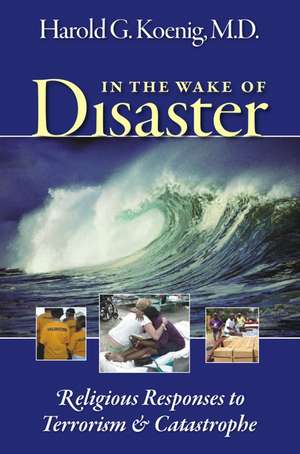In the Wake of Disaster – Religious Responses to Terrorism and Catastrophe
Autor Harold G Koenigen Limba Engleză Paperback – 31 mai 2006
In a timely book with a powerful and persuasive message, Dr. Harold G. Koenig addresses federal, state, and local government policy leaders, urging them to more fully integrate religious organizations into the formal disaster response system, and he then provides recommendations on how this can effectively be done. Koenig also advocates faith communities and organizations to learn more about the role they can play in responding to disasters and terrorism.
The chaotic aftermath of Hurricane Katrina made extraordinarily clear the gaps in the United States' disaster policies. At the same time, the contributions of organized faith communities were highlights amidst the bungled federal, state, and local responses. One example is the New York Times, September 9, 2005, headline: "A New Meaning for 'Organized Religion': It Helps the Needy Quickly." But as faith-based organizations look for ways to help, there are few, if any, guidelines for them.
This book provides information on the psychological, social, and spiritual responses to trauma. It addresses how the emergency response system works, and the role that religious communities can play in disaster response and recovery in terms of providing emotional and spiritual care for victims. It advocates integrating mental health into emergency response systems directed at those affected by hurricanes, floods, earthquakes, and terrorism. "The aim is to help victims of disaster to better cope with the stresses they face, as well as help direct care workers (firefighters, police, health care providers, etc.) to deal better emotionally with the trauma to which they are exposed so they can remain effective and functional on the job," explains Dr. Koenig, whose research on the healing power of faith has been published worldwide.
Increasing the resiliency of our communities in the face of disaster is crucial. Religious communities have tremendous potential to contribute to this. Here are guidelines on how to do that more effectively, alongside data on how to facilitate the integration of these contributions with the formal disaster-response system.
Preț: 193.37 lei
Nou
Puncte Express: 290
Preț estimativ în valută:
37.00€ • 38.71$ • 30.74£
37.00€ • 38.71$ • 30.74£
Carte indisponibilă temporar
Doresc să fiu notificat când acest titlu va fi disponibil:
Se trimite...
Preluare comenzi: 021 569.72.76
Specificații
ISBN-13: 9781932031997
ISBN-10: 1932031995
Pagini: 184
Dimensiuni: 152 x 229 x 20 mm
Greutate: 0.29 kg
Ediția:First Edition, 1
Editura: Wiley
Locul publicării:United States
ISBN-10: 1932031995
Pagini: 184
Dimensiuni: 152 x 229 x 20 mm
Greutate: 0.29 kg
Ediția:First Edition, 1
Editura: Wiley
Locul publicării:United States
Cuprins
Preface / ix
Acknowledgments / xiii
Introduction / xv
1. Psychological and Spiritual Consequences of Disasters / 1
2. National, State, and Local Disaster Planning and Response / 13
3. Religion and Coping with Stress and Disaster / 29
4. The Faith Community’s Role during Disaster / 43
5. Faith-Based Organizations Involved in Disaster Response / 55
6. Coordinating Faith-Based Efforts at the Local Level / 75
7. Preparing Faith Communities for Disaster / 83
8. Barriers and Obstacles to Integration / 97
9. Overcoming the Barriers / 109
10. Final Comments / 121
Resources / 123
Glossary of Terms and Definitions / 139
Notes / 143
Index / 157
Acknowledgments / xiii
Introduction / xv
1. Psychological and Spiritual Consequences of Disasters / 1
2. National, State, and Local Disaster Planning and Response / 13
3. Religion and Coping with Stress and Disaster / 29
4. The Faith Community’s Role during Disaster / 43
5. Faith-Based Organizations Involved in Disaster Response / 55
6. Coordinating Faith-Based Efforts at the Local Level / 75
7. Preparing Faith Communities for Disaster / 83
8. Barriers and Obstacles to Integration / 97
9. Overcoming the Barriers / 109
10. Final Comments / 121
Resources / 123
Glossary of Terms and Definitions / 139
Notes / 143
Index / 157
Descriere
This book provides information on the psychological, social, and spiritual responses to trauma. It addresses how the emergency response system works, and the role that religious communities can play in disaster response and recovery in terms of providing emotional and spiritual care for victims. It advocates integrating mental health into emergency response systems directed at those affected by hurricanes, floods, earthquakes, and terrorism. "The aim is to help victims of disaster to better cope with the stresses they face, as well as help direct care workers (firefighters, police, health care providers, etc.) to deal better emotionally with the trauma to which they are exposed so they can remain effective and functional on the job," explains Dr. Koenig, whose research on the healing power of faith has been published worldwide.
